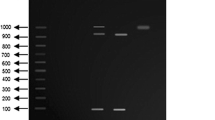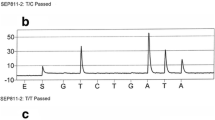Abstract
The significance of translation regulatory factors in elevating the risk of cancer has been recently recognized. Eukaryotic release factor 3a (eRF3a) is a translation termination protein that is encoded by G1 to S phase transition 1 gene (GSPT1). The eRF3a/GSPT1 exon 1 contains a trinucleotide GGC repeat coding for a polyglycine expansion in the N-terminal of the protein. In the present study, we determined the allelic length of the GGCn repeat in the eRF3a gene in 250 women with breast cancer and 250 age-matched controls. Our results show that the presence of the longer allele, 12-GGC, is correlated with threefold increased risk of breast cancer development. Our findings also suggest that women who are homozygous for 7-GGC allele are possibly at higher risk of developing breast cancer, especially before the age of 50. No significant effect of the allelic length of eRF3a/GSPT1 polymorphism on inheritance or the grade of this disease was observed.


Similar content being viewed by others
References
Bray F, McCarron P, Parkin DM. The changing global patterns of female breast cancer incidence and mortality. Breast Cancer Res. 2004;6:229–39.
Johnson N, Dickson-Swift V. It usually happens in older women: young women’s perceptions about breast cancer. Health Educ J. 2008;67(4):243–57.
Harirchi I, Ebrahimi M, Zamani N, Jarvandi S, Montazeri A. Breast cancer in Iran: a review of 903 case records. Public Health. 2000;114:143–5.
Mousavi SM, Montazeri MA, Mousavi Jarrahi A, Harirchi I, Najafi M, Ebrahimi M. Breast cancer in Iran: an epidemiological review. Breast J. 2007;13:383–91.
Zhouravleva G, Frolova L, Le Goff X, et al. Termination of translation in eukaryotes in governed by two interacting polypeptide chain release factors, eRF1and eRF3. EMBO J. 1995;14:4065–72.
Hoshino S, Hosoda N, Araki T, et al. Novel function of the eukaryotic polypeptide-chain releasing factor 3 (eRF3/GSPT) in the mRNA degradation pathway. Biochemistry. 1999;64(12):1367–72.
Hoshino S, Ima M, Mizutani M, et al. Molecular cloning of the eukaryotic polypeptide releasing factors (eRF): its identification as eRF3 interacting with eRF1. J Biol Chem. 1998;273:22254–9.
Chauvin C, Salhi S, Jean–Jean O. Human eukaryotic release factor 3a depletion causes cell cycle arrest at G1 phase through inhibition of the mTOR pathway. Mol Cell Biol. 2007;27:5619–29.
Valouev IA, Kushnirov VV, Tre-Avanesyan MD. Yeast polypeptide chain release factors eRF1and eRF3 are involved in cytoskeleton organization and cell cycle regulation. Cell Motil Cytoskeleton. 2002;52:161–73.
Lee JA, Park JE, Lee DH, et al. G1 to S phase transition protein 1 induces apoptosis signal-regulating kinase1 activation by dissociating 14–3-3 from ASK1. Oncogene. 2008;27:1297–305.
Hedge R, Srinivasula SM, Datta P, et al. The polypeptide chain-releasing factor GSPT1/eRF3 is proteolytically processed into an IAP-binding protein. J Biol Chem. 2003;278:38699–706.
Ozawa K, Murakami Y, Eki T, Yokoyama K, et al. Mapping of the human GSPT1 gene, a human homolog of the yeast GST1 gene, to chromosomal band 16p13.1. Somat Cell Mol Genet. 1992;18:189–94.
Hansen LL, Jakobsen CG, Justesen J. Assignment of the human peptide chain release factor 3 (GSPT2) to Xp11.23Rp11.21 and of the distal marker DXS1039 by radiation hybrid mapping. Cytogenet Cell Genet. 1999;86:250–1.
Chauvin C, Salhi S, Le Goff W, et al. Involvement of human release factors eRF3a and eRF3b in translation termination and regulation of the termination complex formation. Mol Cell Biol. 2005;25:5801–11.
Brito M, Malta-Vacas J, Carmona B, et al. Polyglycine expansions in eRF3/GSPT1 are associated with gastric cancer susceptibility. Carcinogenesis. 2005;26:2046–9.
Malta-Vacas J, Chauvin C, Gonçalves L, et al. eRF3a/GSPT1 12-GGC allele increases the susceptibility for breast cancer development. Oncol Rep. 2009;21:1551–8.
Malta-Vacas J, Ferreira P, Monterio C, Brito M. Differential expression of GSPT1 GGC n alleles in cancer. Cancer Genet Cytogenet. 2009;195:132–42.
Tallheden T, Karlsson C, Brunner A. Gene expression during redifferentiation of human articular chondrocytes. Osteoarthr Cartil. 2004;12:225–35.
Miller SA, Dykes DD, Polesky HF. A simple salting out procedure for extracting DNA from human nucleated cells. Nucleic Acids Res. 1988;16:1215.
Basu J, Williams BC, Li Z, Williams EV, Goldberg ML. Depletion of a Drosophila homolog of yeast Sup35p disrupts spindle assembly, chromosome segregation, and cytokinesis during male meiosis. Cell Motil Cytoskeleton. 1998;39:286–302.
Eastmond DA, Tucker JD. Identification of aneuploidy-inducing agents using cytokinesis-blocked human lymphocytes, and an antikinetochore antibody. Environ Mol Mutagen. 1989;13:34–43.
Acknowledgments
The authors wish to thank all patients who contributed to this investigation and Professor Farzin Farzaneh (Kings College London) for valuable suggestions and critical reading of this manuscript. This work was supported by University of Isfahan.
Conflicts of interest
The authors report no conflict of interest.
Author information
Authors and Affiliations
Corresponding author
Rights and permissions
About this article
Cite this article
Miri, M., Hemati, S., Safari, F. et al. GGCn polymorphism of eRF3a/GSPT1 gene and breast cancer susceptibility. Med Oncol 29, 1581–1585 (2012). https://doi.org/10.1007/s12032-011-0111-x
Received:
Accepted:
Published:
Issue Date:
DOI: https://doi.org/10.1007/s12032-011-0111-x




